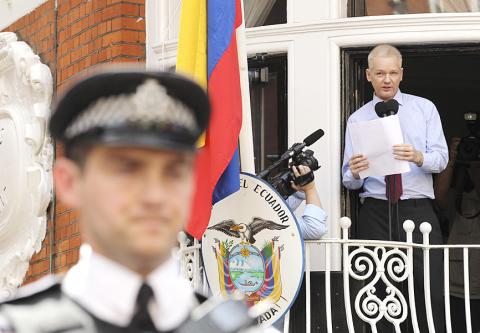WikiLeaks editor-in-chief Julian Assange used the balcony of Ecuador’s London embassy yesterday to berate the US for threatening freedom of expression and called on US President Barack Obama to end what he called a witch-hunt against WikiLeaks.
Speaking from the balcony of the embassy, where he is staying to avoid arrest by British police who want to extradite him to Sweden, Assange said the US risked shunting the world into an era of journalistic oppression.
“As WikiLeaks stands under threat, so does the freedom of expression and the health of all of our societies,” Assange said, dressed in a blue shirt and a maroon tie.

Photo: Reuters
“I ask President Obama to do the right thing: The United States must renounce its witch-hunt against WikiLeaks,” he said in a 10-minute speech that he ended with two thumbs up to the world’s media.
Ecuador has granted political asylum to the former computer hacker who incensed the US and its allies by using the WikiLeaks Web site to leak hundreds of thousands of secret US diplomatic and military cables in 2010.
WikiLeaks had said that Assange would make a statement outside the embassy, stirring speculation that he would be arrested by British police arrayed in force outside the red-brick legation in the opulent Knightsbridge district of London.
However, a workman inside the embassy could be seen yesterday morning prising the hinges off a door leading to a small balcony on the corner of the embassy, signaling that Assange would speak from that perch to keep himself safe from arrest.
Assange, an Australian, is wanted in Sweden for questioning regarding allegations of rape and sexual assault and Britain has said that he would not be granted safe passage out of his Ecuadoran embassy refuge, which enjoys diplomatic status.
Assange, 41, took sanctuary in the embassy in June after exhausting appeals in British courts against extradition to Sweden. He says he fears Sweden would eventually hand him over to the US where, in his view, he would face persecution and long-term imprisonment.
Earlier yesterday, a police helicopter circled overhead while about 40 British police officers in black stab vests were stationed outside the embassy, lining walls under the balcony where Assange was expected to speak.
The exterior door was earlier removed from the balcony above which the yellow, blue and red Ecuadoran flag was draped in what appeared to be preparations for Assange’s appearance.
The balcony was likely to be deemed part of the Ecuadoran embassy, thus insulating him from arrest by British police.

The combined effect of the monsoon, the outer rim of Typhoon Fengshen and a low-pressure system is expected to bring significant rainfall this week to various parts of the nation, the Central Weather Administration (CWA) said. The heaviest rain is expected to occur today and tomorrow, with torrential rain expected in Keelung’s north coast, Yilan and the mountainous regions of Taipei and New Taipei City, the CWA said. Rivers could rise rapidly, and residents should stay away from riverbanks and avoid going to the mountains or engaging in water activities, it said. Scattered showers are expected today in central and

People can preregister to receive their NT$10,000 (US$325) cash distributed from the central government on Nov. 5 after President William Lai (賴清德) yesterday signed the Special Budget for Strengthening Economic, Social and National Security Resilience, the Executive Yuan told a news conference last night. The special budget, passed by the Legislative Yuan on Friday last week with a cash handout budget of NT$236 billion, was officially submitted to the Executive Yuan and the Presidential Office yesterday afternoon. People can register through the official Web site at https://10000.gov.tw to have the funds deposited into their bank accounts, withdraw the funds at automated teller

COOPERATION: Taiwan is aligning closely with US strategic objectives on various matters, including China’s rare earths restrictions, the Ministry of Foreign Affairs said Taiwan could deal with China’s tightened export controls on rare earth metals by turning to “urban mining,” a researcher said yesterday. Rare earth metals, which are used in semiconductors and other electronic components, could be recovered from industrial or electronic waste to reduce reliance on imports, National Cheng Kung University Department of Resources Engineering professor Lee Cheng-han (李政翰) said. Despite their name, rare earth elements are not actually rare — their abundance in the Earth’s crust is relatively high, but they are dispersed, making extraction and refining energy-intensive and environmentally damaging, he said, adding that many countries have opted to

CONCESSION: A Shin Kong official said that the firm was ‘willing to contribute’ to the nation, as the move would enable Nvidia Crop to build its headquarters in Taiwan Shin Kong Life Insurance Co (新光人壽) yesterday said it would relinquish land-use rights, or known as surface rights, for two plots in Taipei’s Beitou District (北投), paving the way for Nvidia Corp to expand its office footprint in Taiwan. The insurer said it made the decision “in the interest of the nation’s greater good” and would not seek compensation from taxpayers for potential future losses, calling the move a gesture to resolve a months-long impasse among the insurer, the Taipei City Government and the US chip giant. “The decision was made on the condition that the Taipei City Government reimburses the related